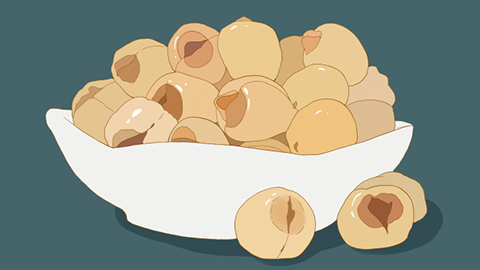What are the functions, effects, and nutritional benefits of lotus seeds?
Generally speaking, lotus seeds usually have effects and functions such as nourishing the spleen and stopping diarrhea, benefiting the kidneys and consolidating essence, nourishing the heart and calming the mind, astringing essence and stopping leukorrhea, promoting digestion, as well as providing nutrients like protein, carbohydrates, B-complex vitamins, minerals, and dietary fiber. The specific analysis is as follows:

I. Effects and Functions
1. Nourish the spleen and stop diarrhea: Lotus seeds have a sweet and astringent taste and a neutral nature, which can nourish and strengthen the spleen and stomach, enhance the digestive and absorptive functions of the spleen and stomach, and help alleviate symptoms such as chronic diarrhea and poor appetite caused by spleen deficiency. They are suitable for individuals with weak spleen and stomach.
2. Benefit the kidneys and consolidate essence: Lotus seeds can nourish the kidneys and have an astringent effect, helping to improve symptoms such as spermatorrhea and involuntary ejaculation caused by kidney deficiency. They assist in preserving kidney essence and maintaining kidney function.
3. Nourish the heart and calm the mind: Components in lotus seeds can nourish the mind, relieve mental restlessness, insomnia, and frequent dreaming, promote emotional calmness, and are suitable for individuals with significant mood fluctuations.
4. Astringe essence and stop leukorrhea: For women, lotus seeds can help manage excessive leukorrhea with thin consistency caused by deficiency of both the spleen and kidneys, helping regulate overall body condition.
5. Promote digestion: Nutrients contained in lotus seeds can stimulate gastrointestinal motility, aid digestion, improve digestive function, and reduce the burden on the gastrointestinal system.
II. Nutrition
1. Protein: Lotus seeds contain a certain amount of protein, an essential component for building body tissues. Protein provides energy and maintains normal physiological activities in the body.
2. Carbohydrates: As one of the main sources of energy, carbohydrates in lotus seeds can quickly replenish the body's energy needs and help maintain normal bodily functions.
3. B-complex vitamins: Lotus seeds contain various B vitamins, such as vitamin B1 and B2, which participate in the body's metabolic processes and are beneficial for nervous system function and skin health.
4. Minerals: Lotus seeds contain minerals such as potassium, magnesium, and iron. Potassium helps maintain normal heart function, magnesium supports bone health, and iron participates in hemoglobin synthesis.
5. Dietary fiber: The dietary fiber in lotus seeds promotes intestinal motility, increases stool bulk, and helps maintain normal digestive and excretory functions of the intestines.
When consuming lotus seeds, it is important to maintain moderation and avoid excessive intake, which could burden the gastrointestinal system. Lotus seeds can be cooked into porridge, used in soups, or eaten directly. Individuals with weak digestion are advised to cook them until soft and tender before consumption.









